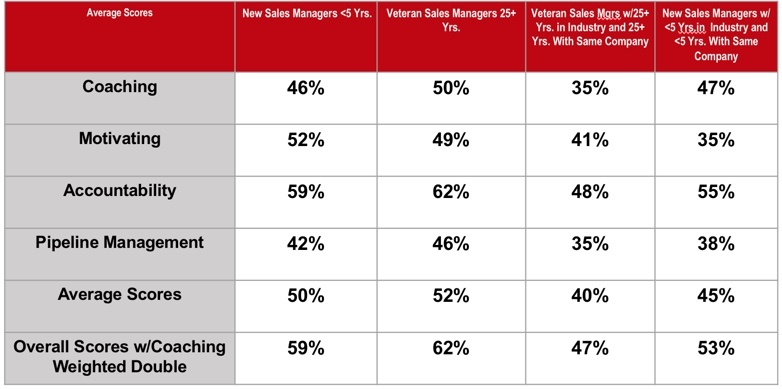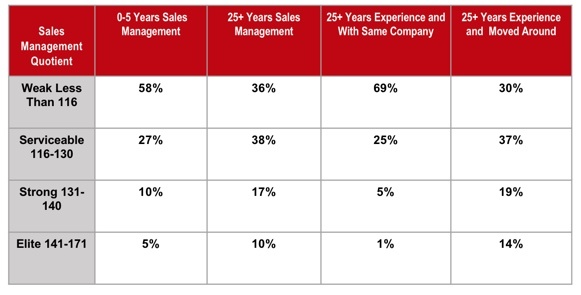- June 25, 2018
- Posted by: Dave Kurlan
- Category: Understanding the Sales Force

Last week I wrote a revealing article which showed that Sales Managers are even worse than I thought when it comes to coaching their salespeople. That article stimulated this great conversation on LinkedIn.
Following that article I dug further into the same 9,000 rows of data to look at the role that tenure and experience have on sales management effectiveness. Who do you think are more effective – newer or more experienced sales managers?
I looked at four of the twenty-one sales management competencies:
- Coaching
- Motivating
- Accountability
- Pipeline Management
My goal was to see if there was any correlation between their tenure and/or experience and their sales management effectiveness. Please review the table below where the average scores in 4 sales management core competencies can be seen for various levels of experience, along with averages for the those 4 competencies and a weighted average.

It’s clear from the average scores that experienced sales managers are only marginally better than inexperienced sales managers in 3 of the 4 competencies, faring worse only in Motivating. However, those scores change dramatically when we look beyond sales management experience.
If we look at sales managers who also have been with the same company and in the same industry for at least 25 years, you’ll see that the scores are 20% worse than for sales managers with similar sales management experience who were with different companies and in different industries during those 25 years. Those with 253 experience grew up in those companies/industries, were risk averse, and by not leaving/moving, were not exposed to new/better practices. As a result, they have simply repeated what they were taught by their ineffective sales managers from 2-3 decades ago.
Compare that with new sales managers who are also new to their companies and new to their industries. Despite having at least 20 fewer years of experience and little in the way of legacy knowledge as a foundation, they average 13% higher scores than those with so much more experience. In fact, column 2 shows that all newer sales managers, regardless of company tenure or industry experience, fare better than all veteran sales managers in column 3.
Finally, average scores can be deceiving and as we all know, coaching is the most important of the competencies. In the last row, we used a weighted coaching score worth double the coaching points and the overall scores still showed that veteran sales managers who experienced multiple companies and industries were stronger overall than any other group.
What happens if we look at the same data using Sales Management Quotient to differentiate?

Interestingly, the largest concentration of elite sales managers is in the same group – those with 25+ years of sales management experience who did not stay with the same company or industry. Those who grew up in just 1 company clearly have the smallest representation in the elite category with just 1%. The reverse is true as well. The experienced sales managers who moved around have the smallest percentage of weak sales managers while those who stayed with one company have more than double the percentage of weak sales managers.
When it comes to sales management capabilities, the amount of experience can be a negative if the kind of experience that makes a difference.
As a whole, these findings also serve to validate a reason that companies look to experts OUTSIDE of their own industry for help. Sales experts with experience in multiple industries bring far more innovation, best practices and practicality to their consulting, training and coaching.

